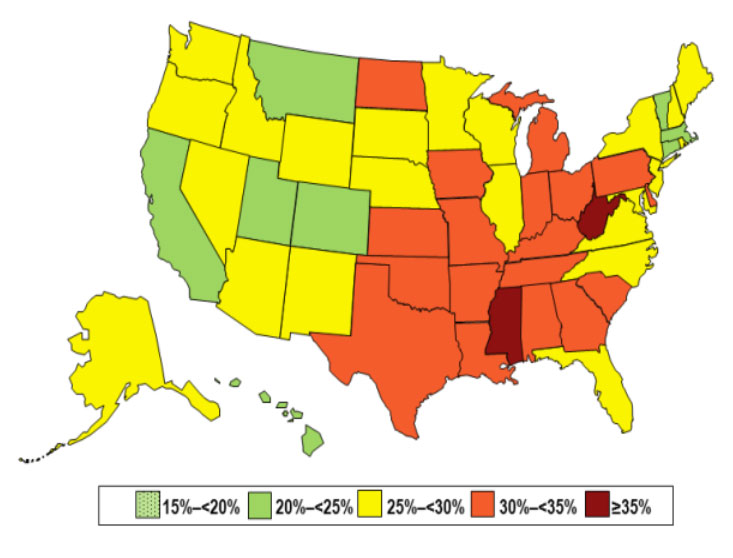Obesity Rates Increased in These 6 States

Adult obesity rates went up in six states between 2012 and 2013, according to a new report.
During that period (the most recent years for which data is available), no states saw a decrease in obesity, but six states — Alaska, Delaware, Idaho, New Jersey, Tennessee and Wyoming — all saw increases, according to the report from the Trust for America's Health (TFAH) and the Robert Wood Johnson Foundation. Delaware had the biggest jump: Its obesity rate increased from 26.9 percent in 2012 to 31.1 percent in 2013, the report found.
Overall, the increase in obesity rates in the United States in 2013 was not as bad as it was in some previous years; For example, in 2005, obesity rates increased in all but one state.
Still, obesity rates remain high overall in the United States, the report said. Mississippi and West Virginia had the highest obesity rate in 2013, both at 35.1 percent. This is the first year that any state has had an obesity rate above 35 percent, the report said. Colorado had the lowest proportion of obese adults, at 21.3 percent. [9 Meal Schedules: When to Eat to Lose Weight]
In general, obesity rates were highest in the South; among the 10 states with the highest obesity rates in 2013, nine were in the South, the report said. States in the West and Northeast had the lowest obesity rates in the country.
The data show that obesity rates were higher among low-income Americans (those who earn less than $15,000 a year) compared to those who earn more than $50,000 a year, the report said. Obesity rates were also higher among blacks and Latinos compared to whites, the report said.
"Obesity rates are unacceptably high, and the disparities in rates are profoundly troubling," Jeffrey Levi, executive director of TFAH, said in a statement. "We need to intensify prevention efforts starting in early childhood, and do a better job of implementing effective policies and programs in all communities — so every American has the greatest opportunity to have a healthy weight and live a healthy life."
Get the world’s most fascinating discoveries delivered straight to your inbox.
Follow Rachael Rettner @RachaelRettner. Follow Live Science @livescience, Facebook & Google+. Original article on Live Science.

Rachael is a Live Science contributor, and was a former channel editor and senior writer for Live Science between 2010 and 2022. She has a master's degree in journalism from New York University's Science, Health and Environmental Reporting Program. She also holds a B.S. in molecular biology and an M.S. in biology from the University of California, San Diego. Her work has appeared in Scienceline, The Washington Post and Scientific American.


